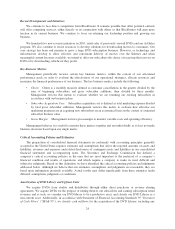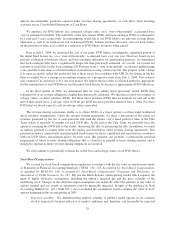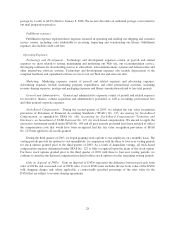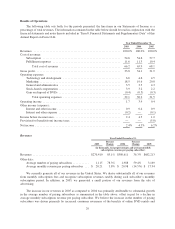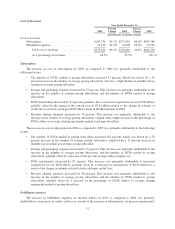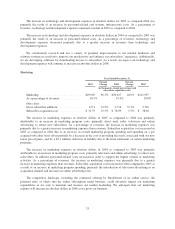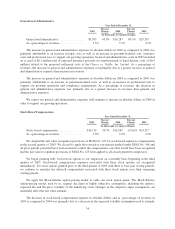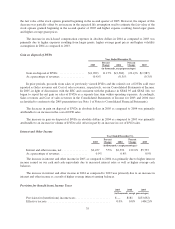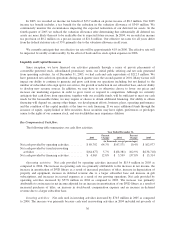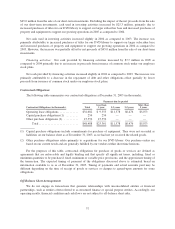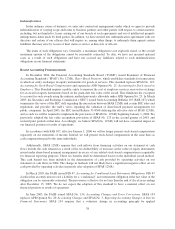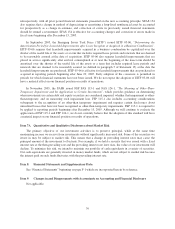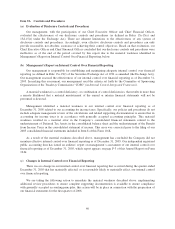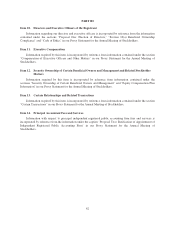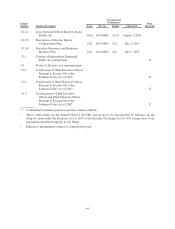NetFlix 2005 Annual Report Download - page 50
Download and view the complete annual report
Please find page 50 of the 2005 NetFlix annual report below. You can navigate through the pages in the report by either clicking on the pages listed below, or by using the keyword search tool below to find specific information within the annual report.
General and Administrative
Year Ended December 31,
2003
Percent
Change 2004
Percent
Change 2005
(in thousands, except percentages)
General and administrative ................. $9,585 69.9% $16,287 80.5% $29,395
As a percentage of revenues ................ 3.5% 3.3% 4.3%
The increase in general and administrative expenses in absolute dollars in 2005 as compared to 2004 was
primarily attributable to an increase in legal costs as well as an increase in personnel-related costs, insurance
costs and professional fees, to support our growing operations. General and administrative costs in 2005 included
an accrual of $8.1 million (net of expected insurance proceeds for reimbursement of legal defense costs of $0.9
million) related to the proposed settlement costs of the Chavez vs. Netflix, Inc. lawsuit. As a percentage of
revenues, the increase in general and administrative expenses was primarily due to a greater increase in general
and administrative expenses than increase in revenues.
The increase in general and administrative expenses in absolute dollars in 2004 as compared to 2003 was
primarily attributable to an increase in personnel-related costs, as well as an increase in professional fees to
support our growing operations and compliance requirements. As a percentage of revenues, the decrease in
general and administrative expenses was primarily due to a greater increase in revenues than general and
administrative expenses.
We expect our general and administrative expenses will continue to increase in absolute dollars in 2006 in
order to support our growing operations.
Stock-Based Compensation
Year Ended December 31,
2003
Percent
Change 2004
Percent
Change 2005
(in thousands, except percentages)
Stock-based compensation ................ $10,719 54.7% $16,587 (13.6)% $14,327
As a percentage of revenues ............... 3.9% 3.2% 2.2%
We adopted the fair value recognition provisions of SFAS No. 123 for stock-based employee compensation
in the second quarter of 2003. We elected to apply the retroactive restatement method under SFAS No. 148 and
all prior periods presented have been restated to reflect the compensation costs that would have been recognized
had the fair value recognition provisions of SFAS No. 123 been applied to all awards granted to employees.
We began granting fully vested stock options to our employees on a monthly basis beginning in the third
quarter of 2003. Stock-based compensation expenses associated with these stock options are recognized
immediately. For stock options granted prior to the third quarter of 2003 with three to four-year vesting periods,
we continue to amortize the deferred compensation associated with these stock options over their remaining
vesting periods.
We apply the Black-Scholes option-pricing model to value our stock option grants. The Black-Scholes
option-pricing model, used by us, requires the input of highly subjective assumptions, including the option’s
expected life and the price volatility of the underlying stock. Changes in the subjective input assumptions can
materially affect the fair value estimate.
The decrease in stock-based compensation expense in absolute dollars and as a percentage of revenues in
2005 as compared to 2004 was primarily due to a decrease in the expected volatility assumption used to estimate
34


